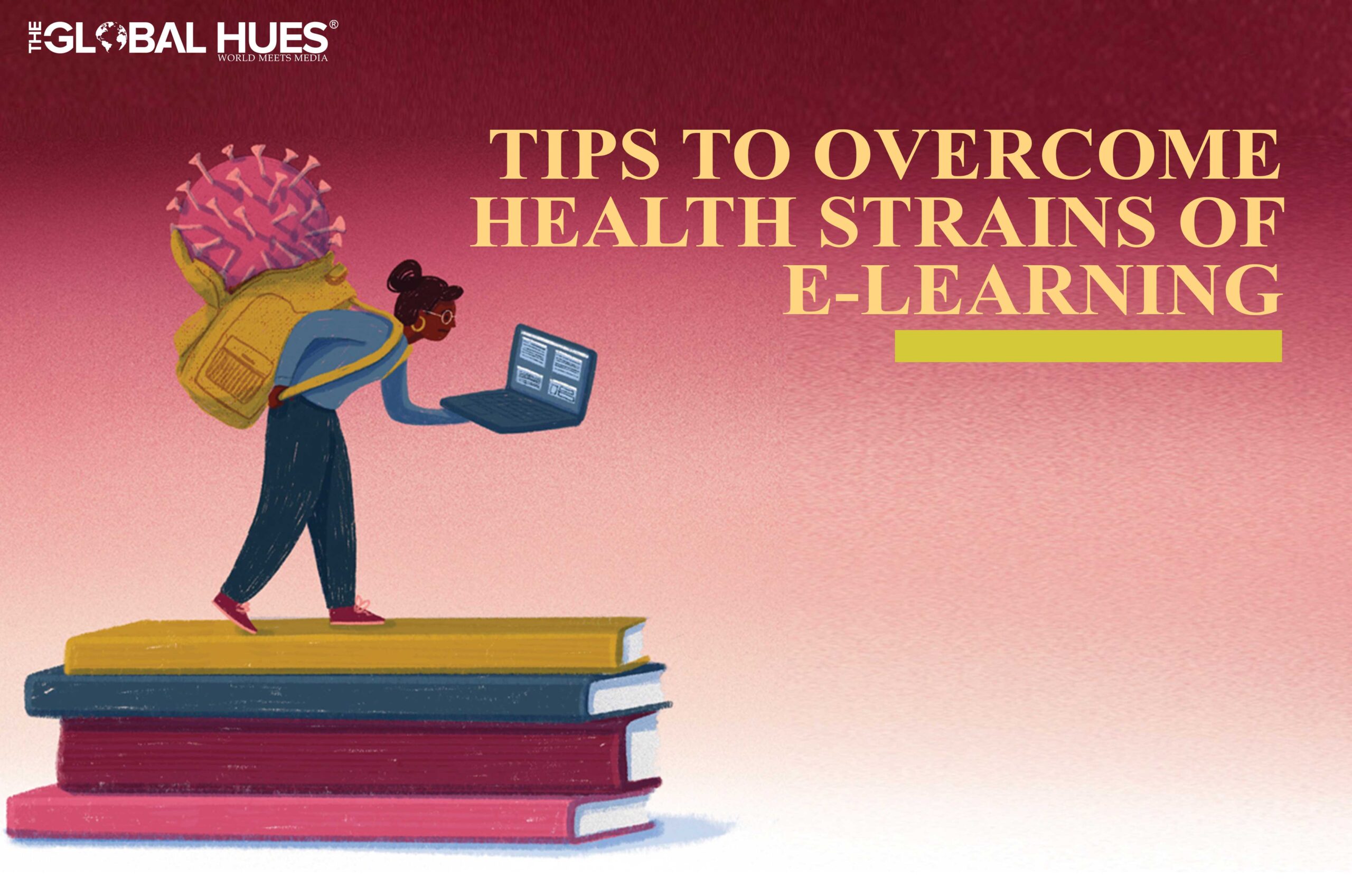The time spent by students on screen has increased drastically due to covid-19 leading to the rise of various health issues.
Online learning has had some major consequences on the health of students. The struggle between good health and spending long hours in front of a screen is not new. Health professionals have always shown concern regarding the impact of digitalization on the health of people. Ranging from small issues like eye strain and back pain to serious illnesses like depression and cancer, everything can be traced back to excessive use of technology. In the current scenario where a student has to willingly or unwillingly spend a good amount of seven to eight hours in front of a computer screen to keep up with their education, health concerns are significantly magnifying.
One major impact of transition in ways of imparting education is on the sleep patterns of students. Many students live in different time zones than the institute they belong to, leading to the sacrifice of proper sleep to attend the classes. In research named “The sleep-deprived human brain,” conducted by Matthew Walker- a sleep scientist at Google,
Sleep deprivation can result in visible deficiencies in the prefrontal cortex of the brain which is the center of the amygdala required to keep the emotional and impulse region of the brain in check. Many studies revolving around screen time suggest that long-duration screen time impacts both mental and physical health and can lead to obesity and depression. The same can also be linked to anxiety and headaches. This is the reason behind big technology brands, such as Apple and Google, have a pre-installed system of tracking screen time.
Technology of suffering
Most students suffer from some common problems that solely arise due to the involvement of technology in education. It is crucial to understand the problem before finding the best possible way to overcome or deal with it.
- While attending an online lecture, children are not bound to follow good ergonomics which can lead to a rise in backaches. Attending classes in the wrong posture, in the comfort of sofas and bed, can lead to fibromyalgia pains. Owing to the increased screen hours, and blurring lines between the personal and educational timings, children are being devoid of physical activities. Most of the time is spent sitting and eating junk. Inevitably children are losing muscle mass and getting obese. Obesity is a major reason for growth to halt. According to research, a child who is more physically active in the initial years of life tends to have a better physical and mental state for the next 3-4 decades of life.
- Physical activities are integrated with levels of vitamin D and calcium in the body. With less physical activity, the amount of these essential nutrients is falling. This can be a major concern leading to illnesses. The low exposure to sun and poor diet also leads to Calcium and Vitamin D deficiencies. Muscle strains, cramps, spasms, and tears can occur commonly when a child is deficient in these nutrients. Not being able to go outside due to covid-19 is a major fallback causing this issue.
- Children who already have weak eyesight or those who squint at computer screens due to poorly adjusted brightness levels are prone to developing eye irritation and strain with long-lasting effects.
- The mental health of both students and teachers is undergoing major ups and downs. The sudden lifestyle change can feed anxiety, loneliness, depression, fear of missing out, etc. Faculty members are dealing with a huge responsibility of maintaining a good environment and health of students and making their class into an effective one on digital platforms.
- The stress and workload to provide the right kind of education on online platforms, which are still not clearly understood by all the teachers, can heighten the concern of burnout. Many faculties who already face pressures of meeting deadlines, completing research, and publications are facing collapse and emotional letdown.
- Anxiety and stress can lead to low immunity, subjecting to diseases. People with stress are reported to have 32 percent more exposure to cancer. Depression is also linked with heart problems. All these impacts can be life-threatening.

Overcoming the harmful effects
- Emphasis on personal hygiene is very important in critical times as such, even when staying at home.
- Parents should help create a dedicated space for kids to attend classes and maintain a separate professional area to promote good ergonomics.
- Limitations on screen time are a must. Children should be held back from using devices for additional hours than necessary.
- To maintain a healthy weight and muscle mass, it is essential to take a balanced diet and avoid junk food.
- Exposure to sunlight, preferably early morning for 30-45 minutes is essential.
- Make exercise a part of the daily schedule of growing children. It can be in the form of Yoga, aerobics, dancing, cycling, or any other activity that leads to exertion.
- Kids usually end up following their parents’ footsteps. Therefore, it is essential to set the right example by maintaining a healthy schedule.
- Ophthalmologists suggest taking regular breaks from the screen every 20 minutes to avoid glare and harmful reflections and adjust the eyes to room lighting.
- Teachers should try to facilitate a classroom environment with frequent discussion to provoke holistic developments and attain the attention of kids during lectures. This also helps students to feel as a part of the class and relieve the loneliness.
- Promote a better sleep pattern in kids. According to a Harvard study, sleep regularity has a direct correlation to GPA.
Avoiding negative impacts is solely in the hands of the parents and the will of the students. By inculcating a disciplined schedule, crunching screen time, interacting with parents and peers, and taking proper sleep and diet, most of the health problems can be avoided and academic success can be accelerated.
- 10 Most Promising E-Learning Companies In India
- Digital Learning: A New Era Of Education
- The New Chapter: Generative AI And Beyond
- 7 Ways That Modern Technology Is Shaping Our World
- How To Become A Pro Trader: Tips From Experts
- A Growth Chart: Scanning India’s Education Sector From 1947 To 2023
- Innovations In Live Learning: Rise Of New Ed-Tech
- How Can You Make Online Learning More Effective?
- Digital Learning: A New Era Of Education




